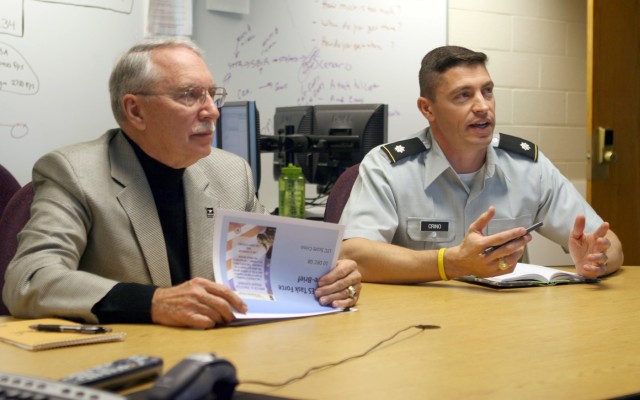
WEST POINT, N.Y. -- The pressure has been building on a small think tank inside Mahan Hall here.
The fact the Army's top general will hear their ideas isn't entirely what makes the senior project of these four U.S. Military Academy cadets so important. Their work could change the lives of Soldiers and their families.
"It's not really for a grade," Senior Andrew Hansen said of the project. "It's making a contribution to something that affects our lives."
Hansen and Seniors David Black, Derek Merkler and Dan Smith have developed a list of recommendations to improve medical and physical evaluation board procedures. They have provided their ideas to retired Gen. Frederick Franks Jr., who is scheduled to brief Chief of Staff of the Army Gen. George Casey later this month about improving the boards.
Franks, USMA class of 1959, was asked by Casey to develop an improvement plan. A task force was created to collect and interpret information. Organizations such as the Department of Veterans Affairs, Office of the Surgeon General, Department of the Army Inspector General and Human Resources Command are part of the task force.
But something was missing -- a fresh eye. Franks turned to USMA to find what engineers call systematic methodology -- making decisions based on creating the solution that provides the greatest value to its stakeholders. In some cases this could mean scrapping the current process and starting over.
The cadets, all from the Department of Systems Engineering, "are bright young people who feel an intense connection to (Soldiers and their families)," Franks said, Dec. 10, while visiting West Point for an update on the cadets' recommendations.
"They have the ability to apply theoretical systems engineering principles to a real-life set of circumstances."
The cadets realize those circumstances could be their own some day or those of a Soldier entrusted to their care once they are commissioned as second lieutenants following graduation.
"This is not just busy work. It matters what we come up with," Smith said.
The cadets' recommendations or information about issues their recommendations are designed to improve are not expected to be made public until after Casey has received them.
But, to make the recommendations, the cadets have been studying reports about the boards by several agencies including the Government Accountability Office. They developed surveys and interviewed wounded Soldiers. Then the cadets applied a dose of common sense and objectivity to develop their recommendations, Black said.
"We are unbiased," Black said. "The only thing we have in it is our future. We are complete outsiders."
To make the recommendations, the cadets used what's known as the systems decision process, Lt. Col. Scott Crino, the systems engineering instructor overseeing the project, said. This process, which was developed by faculty in the USMA systems engineering department and also is known as value-focused thinking, "starts with identifying stakeholders and decision-makers, defining the problem at hand, generating a set of feasible alternatives, then selecting from those that provide the greatest value to the users of the system," Crino said.
Franks and Crino said the cadets' skills and willingness to tackle the problem helped them be successful.
"Four minds, regardless of experience and time in the military, can come up with some great possible solutions," Crino said.
Though the cadets have not had experience with boards, they know the Warrior Ethos -- particularly the portion proclaiming a Soldier will never leave a fallen comrade -- and have a dedication to doing what is right for the mission, Franks said.
"I have been quite pleased to see their thoughtful and thorough work, which is not surprising considering the kind of work they do," Franks said. "I am very grateful to them because the end benefit is for the Soldiers and families."

Social Sharing